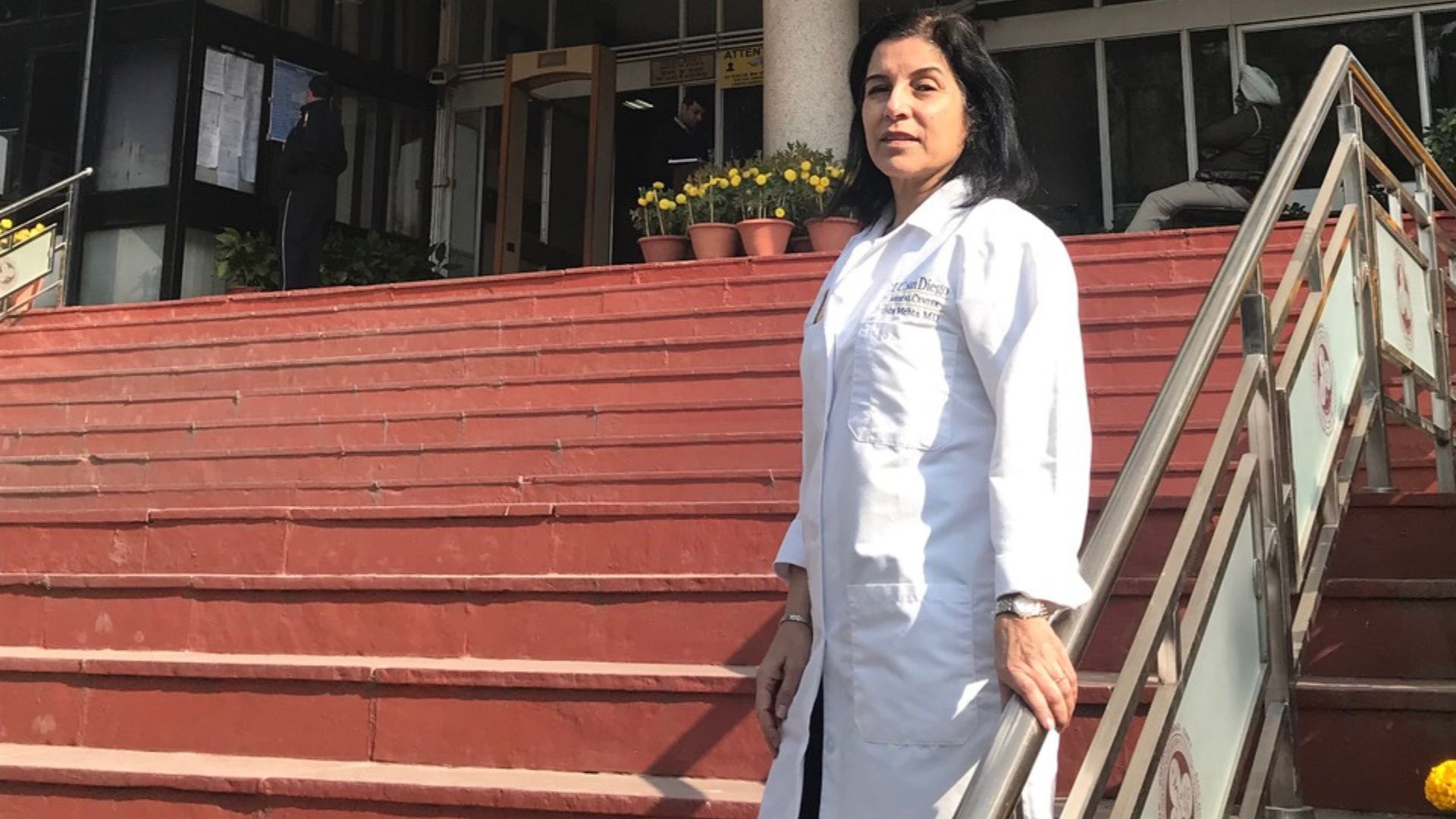American Fulbright-Nehru Scholar Dr. Gita Mehta believes that empowering physicians with effective communication skills can help improve patient care and outcomes.
March 2019

Fulbright-Nehru Scholar Dr. Gita Mehta at the Postgraduate Institute of Medical Education and Research in Chandigarh, where she is developing a curriculum for medical residents on professionalism and medical communication. (Courtesy Dr. Gita Mehta)
Dr. Gita Mehta believes in imparting a personal touch in the health care regime to achieve better results. A Fulbright-Nehru Academic & Professional Excellence Award Scholar, she is working with senior faculty at the Postgraduate Institute of Medical Education and Research (PGIMER), Chandigarh, to develop a curriculum for medical residents on professionalism and medical communication. Dr. Mehta believes that raising competence in communication skills and increasing resilience will better equip medical trainees to meet the challenges of health care delivery in India.
Dr. Mehta is a professor emeritus of medicine at the University of California San Diego (UCSD), where she was on the faculty since 1988, as a clinician-educator. At UCSD, she led a patient-centered clinical practice in internal medicine. Dr. Mehta also developed and implemented a training program utilizing simulation to train junior and mid-level faculty and residents in the Department of Medicine in communication skills, mentoring and providing feedback. Originally from Punjab, she completed her medical degree in 1980, and later emigrated to the United States.
Excerpts from an interview.
In your opinion, what role can effective communication with patients play in achieving better results?
Effective communication, which incorporates a patient’s values and preferences and ensures understanding, has been shown to build trust in the physician. Lack of trust compels people to seek multiple opinions, and leads to poor adherence to treatment, worse outcomes, and retaliation and litigation if there is an adverse event. Communication with people who are increasingly suspicious of physicians’ motives and with low health literacy, especially in resource-poor situations, actually requires better skills to build trust and improve health care outcomes.
Communication, like any medical procedure, is a skill that can be taught. In India, unfortunately, until recently, the focus of medical teaching has been on medical knowledge alone, and teaching communication skills has been considered irrelevant. Now, it is imperative that all physicians are well-versed in this subject.
In India, we have the concept of a family physician, who is trusted and is like a family friend. But, people now complain that this concept is getting replaced by “specialists,” who offer less scope for interpersonal exchange. What is your opinion about this?
Yes, this is a huge loss to the public, and has led to fragmented and poorly-coordinated care. To fill this void, we need two approaches. The patient community needs to appreciate, and appropriately compensate, the family physician, and not seek specialty care for minor complaints. Fresh MBBS graduates cannot do this work effectively, and need enhanced training to rise to the level of a specialist. A skilled family physician can provide timely diagnosis and continuity of care, as well as reduce risks from self-medication. This is especially true for antibiotic overuse, which is partially responsible for high levels of antibiotic resistance in people today.
In the United States, where physicians are trained as primary care providers, health insurance plans require all enrollees to pick a primary care physician. This ensures that people get the necessary preventative care, such as immunizations and care coordination. Additionally, a referral system to specialists helps reduce cost by cutting down on unnecessary procedures and multiple opinions.
You are developing a program on communication skills to empower faculty at the Postgraduate Institute of Medical Education and Research to build a sustainable curriculum for trainees. How are you drawing on your experience of working in the United States and India, as well as your cultural sensibilities?
My work in India was limited to my training as an intern after completing medical school. However, I do understand local cultural norms and, following my interaction with medical professionals in India through family, I have a deep appreciation for the myriad challenges physicians face in the country.
Culturally-competent care is critical as people seeking health care services in India have significant diversity not only in ethnicity, but also in sociocultural beliefs, choice of communication style and preferred level of autonomy. Health care providers need to assess core cultural issues, and also have the skills to personalize care according to the patient’s choice, involving him or her in it to the degree that he or she desires. Ultimately, everyone, regardless of race or socioeconomic status, wants care that is provided with respect and compassion.
Ranjita Biswas is a Kolkata-based journalist. She also translates fiction and writes short stories.
COMMENTS